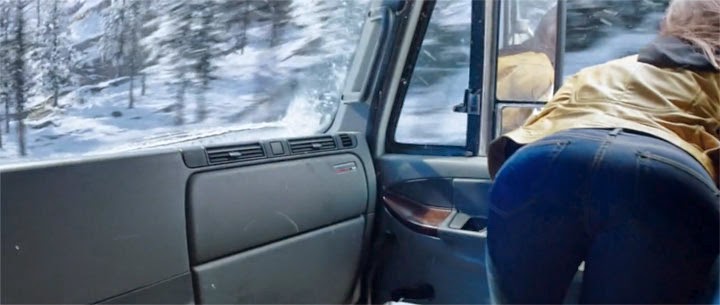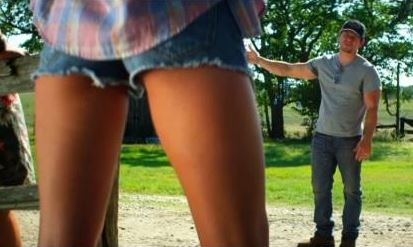You would be hard pressed to find a more contrived film than this, given that it deals with the concepts of space and time as variables and yet everything seems to happen dramatically at the same moment. Sadly, this is just the beginning of the screenplay problems which burden the whole movie and, notwithstanding the often intriguing and satisfying visual space opera we are treated to, all but destroy it. This is Christopher Nolan’s latest film since releasing ‘The Dark Knight Rises‘ and he is joined by his brother Jonathan on writing credits, together delivering not only clichés of science fiction but of their own work as well.
Set in a troubled future where crop blights have made survival on planet Earth very difficult, the story focuses on Coop (Matthew McConaughey), a former astronaut who now runs a farm with his father (John Lithgow) and two young kids, Murph (Mackenzie Foy) and Tom (Timothée Chalamet). Mysterious anomalies in the area lead the inquisitive Coop and Murph to a secret governmental institution which will eventually be responsible for the former adventurer once again taking to the skies – this time in an attempt to find a new habitable planet for the future of the human race to colonise (it’s also the second major science fiction epic for McConaughey after ‘Contact’ in 97). The core of the film focuses on family, humanity and adventure whilst making several attempts to treat us to a healthy dosage of real physics – in fact, the filmmakers combined forces with theoretical physicist Kip Thorne, whose work initially inspired the film, and used real maths and data (many hundreds of terabytes worth of it) to produce the visualisation of a supermassive rotating black hole that they are fairly certain is what the thing will actually look like out there in space (it’s pictured above), and scientific papers based on their efforts have gone into publication, unusually uniting film with rigorous academia.
True to Nolan’s style, however, he takes a really interesting premise that he’s gone to great efforts to ground in reality and feasibility, and then he just rips everything up and writes a load of absolute gibberish, abruptly halting the journey he’d been taking us on. Think back to ‘The Dark Knight’ (08) when you had this wonderfully atmospheric and tense delivery, full of real stunts and real machines that actually operated as shown – and then right in the middle of the film he has his main character, Batman, jump off a skyscraper and land on a car below, damsel in distress in tow, completely unharmed despite having absolutely nothing to break or slow their fall (other than the aforementioned car). It’s completely ridiculous – why go to all that effort to make it realistic if you’re then going to blow it for no reason, and I love the Batman films so I still enjoyed them but I really wish he’d stop destroying the worlds and universes that he is so adept at creating.
Interstellar suffers from three major problems – one, the trailer completely spoils the central part of the film, and this is where the tension is really supposed to bite. Two, the writing of Amelia Brand (Anne Hathaway) is diabolically poor, in fact she is easily the worst character they have ever created (they probably would have been well served enlisting the help of a female touch with the screenplay here) and unfortunately this combines perfectly with fault number one. Thirdly, alas in no small measure also combining with fault two, the plot asks us to make enormous galactic leaps with our suspension of disbelief which are comically too big. There is an attempt to bring a spiritual, emotional, human element into play which is often done in science fiction (1968’s ‘2001: A Space Odyssey’ for example, achieved it sensorially via artful direction and classical music) but it has to be done in such a way that the audience are going to be willing to take the leap because, well, why not? By simply going to the cinema there is an inherent willingness to invest in the movie and good art should expand our horizons anyway – it is not supposed to, as in this example, have the audience guffawing and sighing in irritation.
The visuals are a very curious mix of impressive (the black hole is terrific, especially when we realise it’s the most realistic depiction science is currently capable of), mainly average (background stars in our Solar System are conspicuously lacking, and generally the views of space aren’t as inspiring as they should be) and downright terrible (for some unknown reason there is a docking sequence where the models used look like they came straight out of the cupboards for ‘Space: 1999’, best case scenario is they were deliberately going for 70’s nostalgia), the score from Hans Zimmer is simple, atmospheric and very memorable although it does drag on throughout most of the film without changing all that much (I’ve seen the film twice now – the effects of this stack), a number of famous faces appear which continues to dilute the believability, and all in all I did still enjoy a lot of what is on display, but there is just no getting around the level of ridiculousness involved and the directly proportional disappointment, and I am often all for getting behind science fiction that wants to take artistic vaults into the unknown. The heart of this is uplifting, but the delivery is catastrophic.




